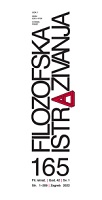Prolegomena za odredbu i pozicioniranje nihilizma kod Friedricha Nietzschea
Prolegomena for the Determination and Positioning of Friedrich Nietzsche’s Nihilism
Author(s): Tomislav Bunoza, Stjepan RadićSubject(s): Metaphysics, Ethics / Practical Philosophy, 19th Century Philosophy, Ontology
Published by: Hrvatsko Filozofsko Društvo
Keywords: Friedrich Wilhelm Nietzsche; truth; good; morality; act; existence; conflict; nihilism; perspectivism; value;
Summary/Abstract: The analysis of cognitive-ontological and especially ethical concepts in Nietzscheʼs philosophy shows deprivation as an important component that compromises their status. The emptiness, in the form of purity, inevitably appears during the decomposition of Nietzsche’s thought. Under the influence of perspectivism, epistemology, along with the question of truth, have undergone radical deconstruction. The results significantly affect the existence of morality, values and the notion of good in general. Deprivation appears in values, which leads to pessimism. Pessimistic values move away from the intensity of life instinct. As a reflection of life, man strives and destroys the aspirations for life. The whole reality, on the other hand, is in opposition and thus, necessarily, in dialectic and conflict. Nietzsche, however, does not strive for (Hegelian) reconciliation (versöhnen) opposites, but requires their enduring (dulden), which is, at the same time, overcoming. Conflict between pessimistic and life valuesinevitably arises. Pessimism precedes nihilism, which alternates the notion of truth, meaning, and foundation. In the concluding analysis, it becomes clear how the value creator is placed in relation to the concept of eternal return and overcoming nihilism. Emptiness and lack of sense are replaced by a dynamic and conflicting conception of life, i.e. existence, where the dynamics of life must not be understood in an organic or other bio-morphological sense, but in relation to the individual and his creative potential only in the form of change and reestablishment of reality. This, in turn, means that, ultimately, the focus is on the subject, man as will and his existential acts.
Journal: Filozofska istraživanja
- Issue Year: 42/2022
- Issue No: 01/165
- Page Range: 131-152
- Page Count: 22
- Language: Croatian

